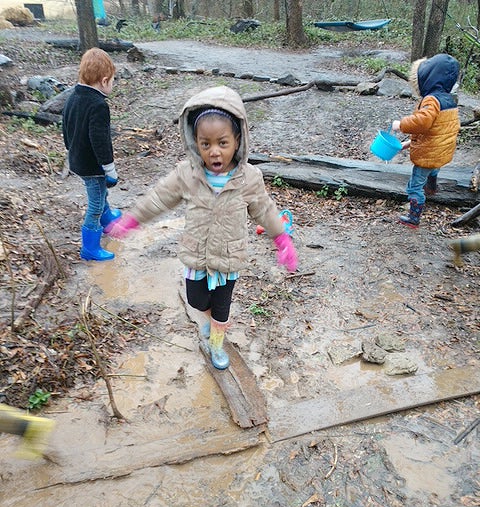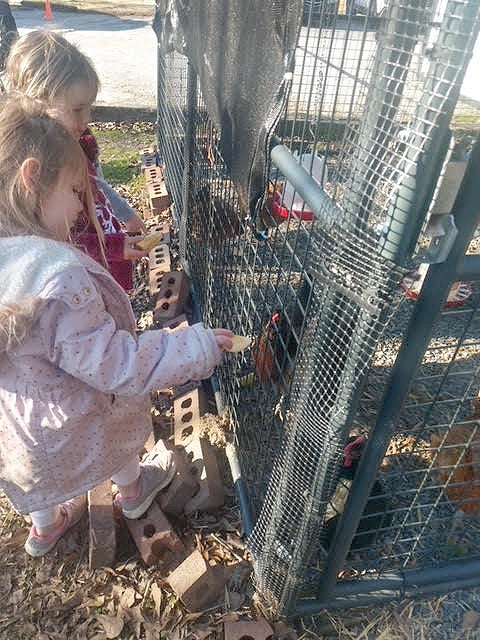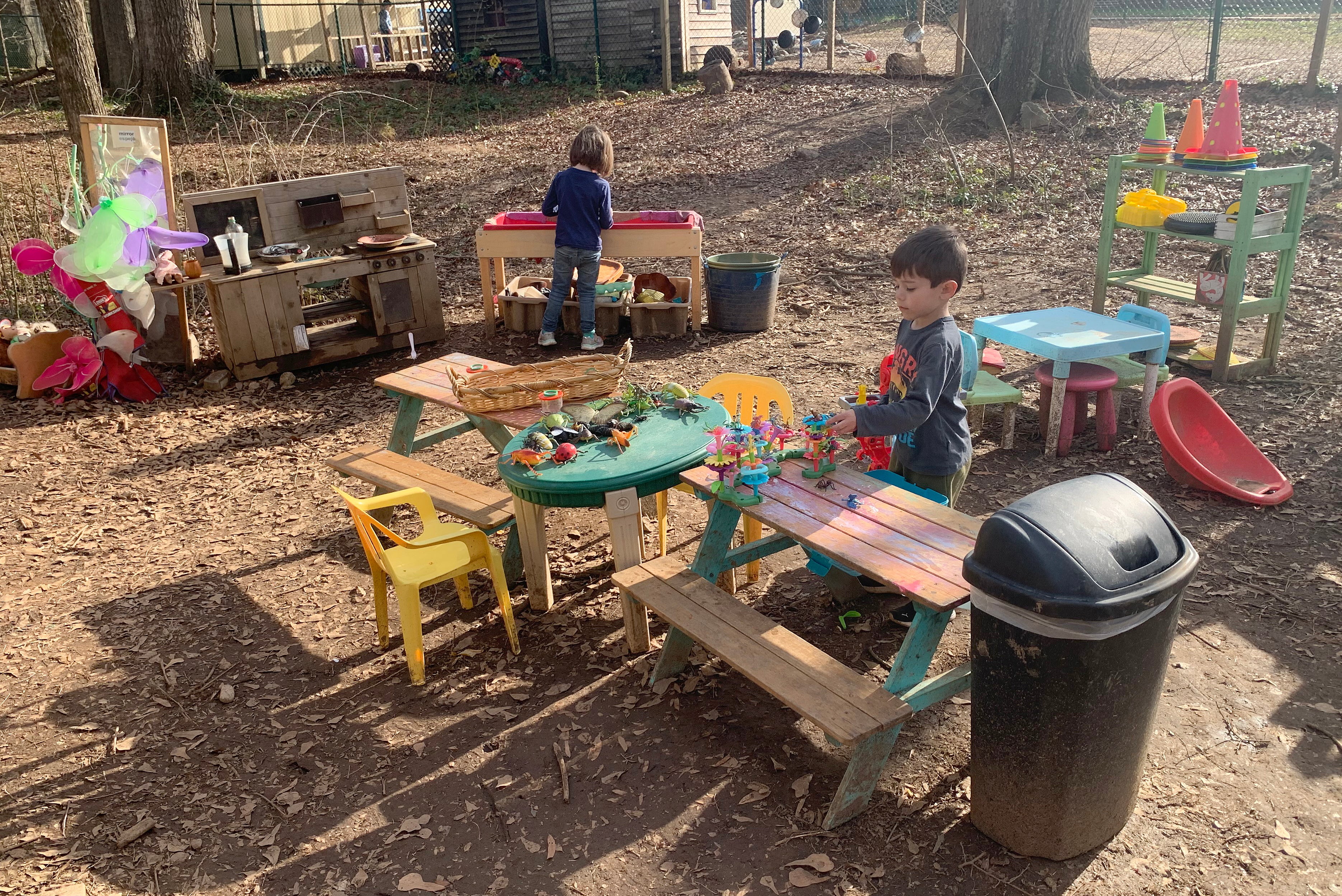The great outdoors: Partners in Learning takes classroom outside
Published 12:10 am Thursday, February 16, 2023
SALISBURY — Everyone has fond memories of spending time outdoors as a child, but the life skills developed while playing in the backyard are not as readily apparent.
An early education center in Salisbury transferred the concept of outdoor play into a classroom of sorts by putting those children into a learning environment in the great outdoors.
Partners in Learning started more than a quarter century ago on the Catawba College campus, with the goal of curating a broad array of services and supports sensitive to individual, cultural and family differences. The organization has integrated the new outdoor classroom concept into its curriculum in the past year.
“We had this wonderful outdoor area that was being utilized during the summertime, or certain classrooms would come out here and do certain activities,” said Amy Vestal, the Partners in Learning development director. “When we began piloting this program, we thought nestled in the very back corner was the perfect spot for our outdoor classroom, naturally.”
Taking the learning environment outside began as a vision for Partners in Learning Executive Director Norma Honeycutt after reading Richard Louv’s “Last Child in the Woods: Saving Our Children from Nature-Deficit Disorder.”
“Scientific evidence suggests that nature-deficit disorder contributes to a diminished use of the senses, attention difficulties, conditions of obesity and higher rates of emotional and physical illnesses,” Honeycutt said. “As a mother of five children and eight grandchildren, primarily boys, it spoke to me.”
The book’s exploration of how thoughtful exposure of youngsters to nature could be a powerful form of therapy for attention-deficit disorder and other maladies stood out to Honeycutt.
“I have watched technology steal more of our children’s lives and time outside for years,” Honeycutt said. “We made it a priority that all of our children spend a minimum of one hour a day outside, but I dreamed of a full-time outdoor classroom.”
The COVID-19 pandemic temporarily derailed that vision but also substantiated Honeycutt’s viewpoint.
“When COVID-19 hit, it only accelerated children spending more hours in front of the screen and young children’s mental illness,” Honeycutt said. “Before COVID-19, Centers for Disease Control and Prevention data found 1 in 5 children had a mental disorder, and since then, it has continued to grow.”
Honeycutt’s personal immersion in nature had been a “saving grace.”
“Nature is where I can spend time with God and center myself,” Honeycutt said. “I wanted this for the children at Partners In Learning.”
The executive director wasn’t sure how the idea would go over with parents, but after presenting it to them, she was delighted to see how many were on board.
“We were still determining if the parents would be receptive to it, so we held an information session, shared the research, and answered their questions,” Honeycutt said. “To our surprise, all parents were on board, even though some were apprehensive. Within the first month, that apprehension was resolved, and all parents and children loved it.”
One of Partners in Learning’s teachers, Krissy Weeks, shared Honeycutt’s passion. In 2021, they put together a team to bring the dream to reality and opened the first full-day outdoor immersion classroom.
The students have everything they would in a regular classroom without the four brick walls.
Vestal indicated that the children could develop a sense of the space in a safe and meaningful way.
“There are no walls out here, but the kids stay together and understand the natural boundaries that are put into place,” Vestal said. “It’s an amazing phenomenon to see how even without walls, they know exactly where the boundaries are without having to be a hover caregiver. You don’t have to hover over them and say, “no, don’t go there.”
According to the instructors, the natural boundaries of the classroom create a space that encourages internal and external exploration.
“They can explore everything out here,” said Heather Fidler, the Partners in Learning Catawba director. “We have seen a lot of kids have changes in behavior. It is a great way for them to build life skills like risk management, being able to assess what is a risky situation to me and what can I try to do and experiment with that.”
Honeycutt added, “Our staff uses compassionate nurturance to help children feel comfortable and gently encourage them to expand their comfort zones. That might mean climbing a slippery steep hill that used to frighten them, learning to hold still while hiding behind a log in a hiding game, or using words to say how they feel and resolve a conflict. Children often lead the way as we follow their curiosity, but we also gently push them to try new things. As a result, they go home each day from our outdoor classroom tired, muddy and happy.”
According to Fidler and Honeycutt, the sensory development that the children are honing is more than just a skill. It is a gateway to a life of learning.
“The preschoolers learn social-emotional skills while forming connections to the world,” Honeycutt said. “They are encouraged to be curious, ask questions and explore, which helps cultivate a lifelong love of learning. The classroom may look and feel like play to the child, but our teacher has a subtle way of weaving peacemaking, community-building and respect and love for learning every day.”
Weeks explained that while they follow a guided curriculum, many of the subjects they discuss come from the children.
“We have weekly lesson plans that stick with a child-led theme, something they are interested in personally,” Weeks said. “This week, we are learning about love because the children are talking a lot about Valentine’s Day. They are getting a lot of feedback at home about love and engagement and family, so we bring that out here.”
Given the success they have seen during the past year, Partners in Learning staff are optimistic about the opportunities that the organization’s new site on Martin Luther King Avenue, which will open in the fall, will provide for the outdoor learning environment.
“Plans are already in place for our outdoor immersion classroom, and we are continuing to raise funds to develop it fully,” Honeycutt said. “With the success of our current classroom, the dream is for additional outdoor immersion classrooms. With the eight beautiful acres donated by Brenda and Gerry Woods, the opportunities are endless.”






